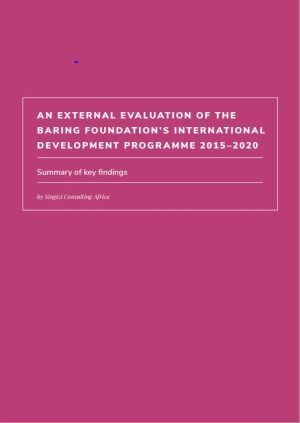Our partners will remain central to our strategy going forward, as will our work to bring more and better resources to the field.
The Foundation has focused its international funding on LGBTI communities in sub-Saharan Africa since 2015. We have a particular focus on lesbian, bisexual and queer women and trans communities who receive only a tiny share of donor, and even human rights, funding.
We do this work because we know that LBQT people across the continent continue to face grave human rights abuses and are often excluded from mainstream society, economic opportunities and appropriate healthcare. In the last six years, we have also been privileged to learn more about how LGBTI civil society is vibrant, resilient and making change.
The programme has also allowed us to explore not just what we fund, but how we fund. Almost two thirds of our funding has gone to support three grant makers – UHAI EASHRI in East Africa, The Other Foundation in Southern Africa and ISDAO in West Africa – who are regionally based, led by activists and committed to participatory grantmaking involving the communities their grants support. Their existence, development and success are central to our strategy.
In 2021, we reflected on five years of this programme and commissioned an independent evaluation from Singizi Consulting to guide our discussions. The team reviewed and engaged with all our international development grantmaking since 2015 and at the heart of the evaluation were three questions: Have we been an effective partner? What practices should we keep? And, what should we do differently?
Refreshingly, the evaluation addresses some more important issues first:
- Since 2015, LBQT civil society in sub-Saharan Africa has continued to grow and to achieve real change for its communities. This includes visible and successful engagement with state institutions, like participating in a National GBV taskforce or ensuring Intersex was included as a category on the Kenyan census for the first time;
- UHAI, ISDAO and The Other Foundation are creating the capacity for funding to LBQT civil society in their regions. However, they also play the role of mentor, convenor and researcher – these are valued highly alongside the funding they provide.
None of these successes can or should be attributed to the Foundation, but it is a pleasure to have contributed to this amazing work. In fact, our decision to step back and leave space for our partners to ‘determine their own pathways’ and to facilitate spaces for ‘the community to decide on strategic priorities’ could be seen as one of the strengths of the programme.
Our unique role as a private foundation also gives us a useful toolkit for this approach – we have the capacity to be nimble, flexible and responsive, all of which have been helpful to partners during the last five years.
Finally, the programme has always worked to amplify the voices of our partners as we work to bring more money to this chronically underfunded part of civil society. As a UK based funder, we see a distinct role for the Foundation in building the case for further funding from other donors and we hope to support further purposeful discussions on these issues between funders of all kinds.
So, have we been an effective partner? Well, in a world where change seems to be a constant and the work for LGBTI rights continues to be urgent and contentious, I am already on to the next questions: what practices should we keep and what should we do differently? We will certainly evolve in the years ahead. What I do know is that our African partners will remain central to our strategy going forward, as will our work to bring more and better resources to the field.
The External Evaluation of the Baring Foundation’s International Development Programme 2015-2020 is available on our website.
Poonam is a Baring Foundation trustee and Chair of the International Development Committee.
